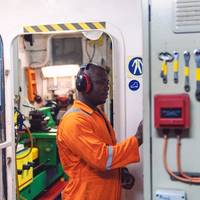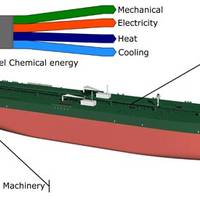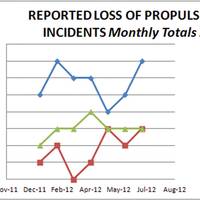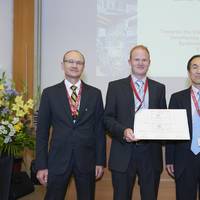Attracting More People of Color to the Maritime Workforce

In the United States, marine transportation is responsible for $361 billion, or 1.7% of the U.S. Gross Domestic Product (GDP). Marine transportation, a key part of global logistics and responsible for 40% of international trade, goods and services, is the backbone of U.S. trade. In the U.S. in 2021 alone, ships have transported more than 1.5 billion tons of cargo valued at more than $1.5 trillion; in that same time period, U.S. ports have facilitated approximately 450,000 ships, which is more than 10% of the global amount (McLean, 2021).
LANL Releases New Sea-Ice Computer Model
Los Alamos National Laboratory (LANL) with several collaborating groups released an update for an internationally vital sea-ice computer model, called CICE version 6.0, a timely tool that supports more accurate forecasting of ice occurrence and global climate modeling.“This update improves our ability to understand a type of anchored ice, called land-fast ice, that is attached to the shore or sea bottom and can block shipping lanes and northern ports,” said Elizabeth Hunke, lead developer of the CICE model. “The polar regions are not desolate, they’re actually alive with shipping, energy development, fishing, hunting, research and military defense operations,” Hunke noted.“Sea ice makes navigation hazardous, as thick ice can block fishing boats and even makes it difficult for U.S.
DNV GL Introduces Energy Efficiency Methodology

DNV GL presents a novel approach that overcomes challenges of assessing on board energy efficiency in a consistent manner. As a result, priorities for improvement can be determined accurately. In a new report released, DNV GL answers the question: How can a ship manager identify the biggest sources of useful energy that are currently being wasted on their ships? “Ship operations and environmental legislation have become more complex, and it has become increasingly difficult to assess or even define efficiency with consistency and accuracy…
North American ECA – Today

On August 1, 2012, the North American Emissions Control Area (NAECA) took effect, mandating the use of 1.0% sulfur Heavy Fuel Oil (HFO) or residual fuel oil for ships within 200 miles of the continent of North America. California has mandated the use of distillate fuel when ships are within 24 miles of its coastline since July 1, 2009. Lessons learned from California’s experience with distillate fuels may benefit operators as the next phase of NAECA comes into effect (January 1…
3rd CIMAC CASCADES: Seminar for Younger Engineers

The third staging of the CIMAC CASCADES seminar for younger engineers and students took place at the ETH Swiss Institute of Technology in Zürich, Switzerland on June 8, 2012. Organized by the CIMAC National Member Association (NMA) in Switzerland, the Division Combustion Engines of the Swiss Mechanical and Electrical Engineering Industries (Swissmem), the event was considered a considerable success by all attendees. In what may become the standard framework for a CASCADES event, the seminar itself was preceded on 7th June 2012 by a visit to a member company’s facility.
Talbert, Toma & Bobillier Join Transocean Board
Transocean Ltd. (NYSE: RIG) (SIX: RIGN) announced that the Board of Directors has named J. Michael Talbert as non-executive Vice Chairman of the Board, Arnaud A.Y. Bobillier as Executive Vice President, Asset and Performance, and Ihab Toma as Executive Vice President, Global Business, effective immediately. As non-executive Vice Chairman, Talbert is expected to succeed Robert E. Rose as Chairman of the Board of Directors when Rose retires at the end of his current director term at the company's 2011 Annual General Meeting of Shareholders. Bobillier will be responsible for the company's Engineering and Technical Support; Asset Management, Performance, Global Supply Chain and IT functions.
Admiral Engages Engineering Class During Sacramento Navy Week
Commander, Regional Maintenance Centers and the Navy's flag ambassador for Sacramento Navy Week engaged an engineering class at , on March 12. Rear Adm. John Clarke Orzalli, commander, Regional Maintenance Centers visited the university to talk about his lifelong passion in engineering and problem solving. "Something happens and we need to figure out why and develop solution models so it doesn't happen again," said Orzalli. Students in the Thermodynamics class found out early on that having a guest speaker was not going to be a free period. The admiral wasted no time immersing the entire class in science and engineering theory that made the majority of them sit up and engage the him for over an hour.
MITAGS to Offer Gas Carrier Inspection Course

Glen Paine, Executive Director of the Maritime Institute of Technology and Graduate Studies (MITAGS) and the Pacific Maritime Institute (PMI) announced today that MITAGS has been awarded the U.S. Coast Guard five-year firm, fixed price Gas Carrier Inspection course. The two-week Gas Carrier course, which has been approved by the U.S. Coast Guard, provides familiarization in Gas Carrier theory with a basic understanding of thermodynamics, chemistry of cargo, and safety and health hazards. Fire fighting theory and liquid and vapor leak procedures are extensively reviewed. U.S.
The Natural Order
The impact of increasingly stiff rules from legislators regarding ship engine emissions combined with ever increasing demands from ship and boat owners of better life-cycle performance and fuel economy has placed the onus squarely upon the diesel engine manufacturing community to continuously improve products and systems. While the diesel engine community has responded in kind with a variety of enhanced designs and concepts, there is a revolution spurred by evolution brewing in academia which promises to, at the very least, arm diesel engine makers with a system to quickly and cost effectively optimize current diesel engine performance, and to possibly even help to reshape the diesel engine's inner and outer appearance in the name of improving performance.
STN Atlas Trains WIth Modular Simulators
In response to a change in emphasis from certification to verification of competency as per the upgraded Standards of Training Certification and Watchkeeping (STCW 95) convention, the ISM code now calls for additional reliance on simulators for maritime training. STN is complying with these demands for engine room operatives with its new Atlas SES 4000 series of engine room simulators, which are based on real-time physical mathematical modules rather than the conventional look-up tables. To train for the competence for the work out of planning schedules, entails not only complex start-up and shut-down procedures for main propulsion and auxiliary machinery - but for management of fuel, ballast, cooling and other systems as well.









